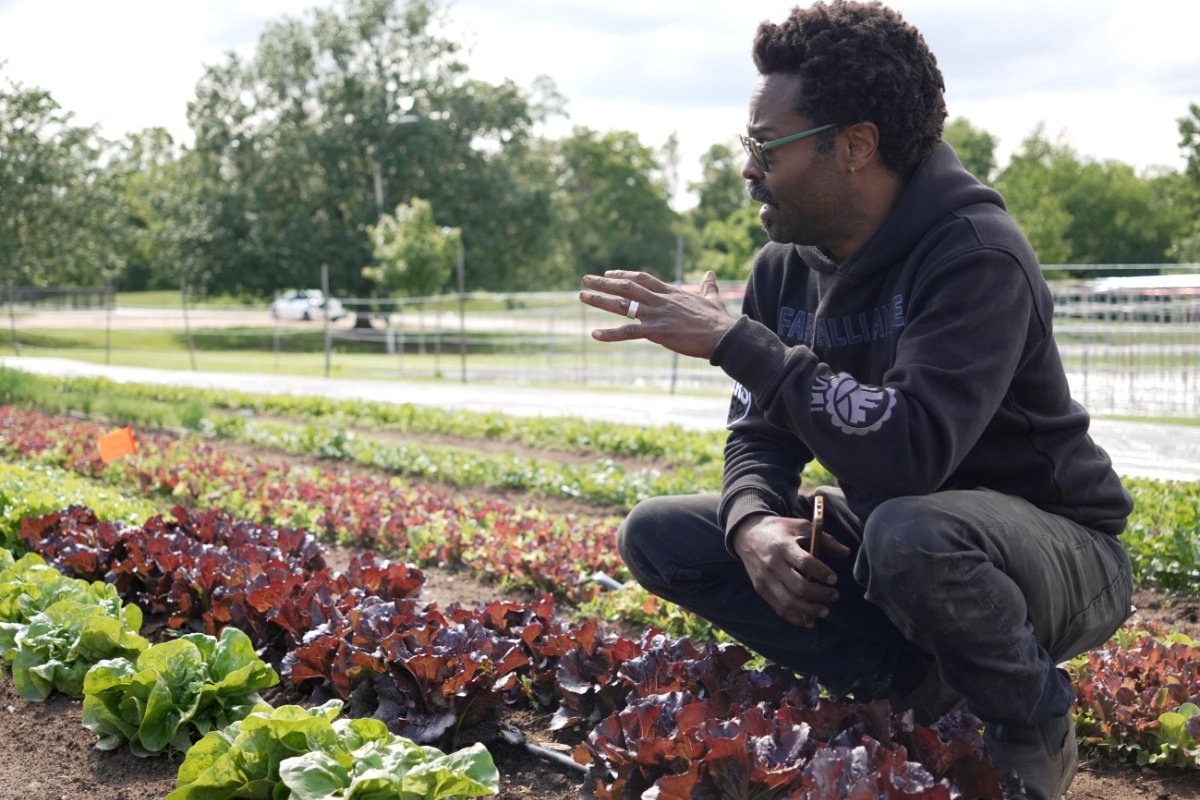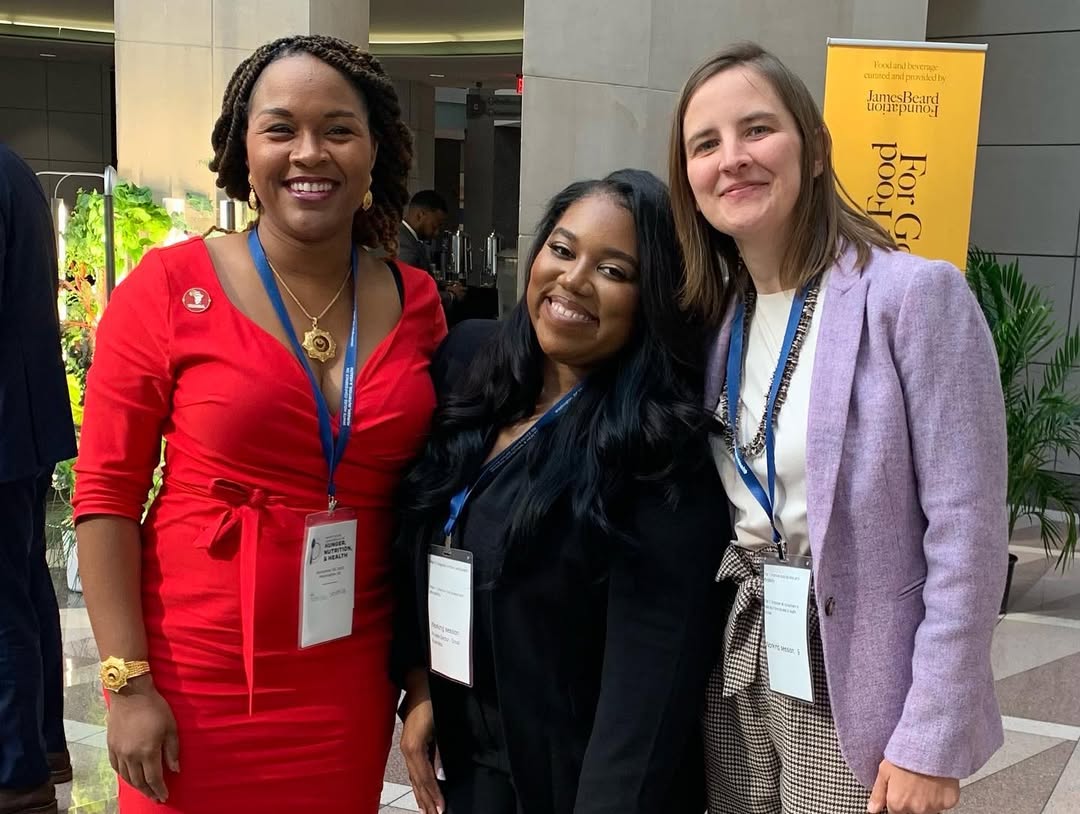At Black Butterfly Teaching Farm, locals learn to build a climate-resilient food system with economic potential in the midst of an industrial city. Funding cuts now jeopardize that mission.

At Black Butterfly Teaching Farm, locals learn to build a climate-resilient food system with economic potential in the midst of an industrial city. Funding cuts now jeopardize that mission.
June 30, 2025

Denzel Mitchell at Black Butterfly Teaching Farm. (Photo credit: Sam Delgado)
A version of this article originally appeared in The Deep Dish, our members-only newsletter. Become a member today and get the next issue directly in your inbox.
Expand your understanding of food systems as a Civil Eats member. Enjoy unlimited access to our groundbreaking reporting, engage with experts, and connect with a community of changemakers.
Already a member?
Login
In southern Baltimore, not far from the sewage treatment plant of Wagner’s Point and massive coal mounds of Curtis Bay, lies a small farm of green grass, rustling trees, and rows of radishes, arugula, peppers, and more. On a cool afternoon in late May, groups of children and their parents pass by, cutting through a dirt path on their way to some other part of this historically industrial city. As they come and go, a small crew of farmers diligently tends to the crops and land.
This is the Black Butterfly Teaching Farm, run by the Farm Alliance of Baltimore (FAB), a membership organization of urban farmers, neighborhood growers, and those interested in learning more about both. The farm was designed to turn food-curious people into urban farmers, especially those who live or work in the “Black Butterfly”—the regions of the city to the east and west of the center, shaped like a pair of butterfly wings, where the city’s majority Black population lives.
“The folks that tore it apart have no intention of fixing it.”
These neighborhoods continue to grapple with a legacy of redlining, with impacts that persist today—from a scarcity of grocery stores to a lack of tree cover (and resulting “heat island” effect) to lower life expectancy in general, often due to environmental pollutants.
Urban farms, though, represent a tangible way for people to have “a sense of control and autonomy” over their health and environment, says Hannah Quigley, a policy specialist with the National Sustainable Agriculture Coalition (NSAC). By enriching the environment and helping build a climate-resilient food system with economic potential, urban agriculture can unlock a form of empowerment for disadvantaged communities.
“It has real big community effects,” Quigley adds. “It’s not just helping one household in a lot of these settings. It’s helping hundreds of individuals in these neighborhood settings.”
Since 2021, the FAB has operated the Black Butterfly Urban Farmer Academy, which launched the teaching farm later that year and has graduated two groups of trainees. But this year, the program won’t be offered, as it takes a step back to finish several construction projects on the farm and to adjust to funding cuts by the U.S. Department of Agriculture (USDA).
“I’m really looking forward to the full vision coming to fruition,” says Denzel Mitchell, FAB’s executive director and a former urban farmer himself, about the construction. He says they’re aiming to set up fencing, a greenhouse, an outdoor kitchen, a storage barn, and additional amenities for the community by the end of the year.
The Trump administration has cut many farming initiatives, including those addressing climate change and environmental injustice. That leaves programs like Black Butterfly—which aim to instill sustainable agriculture knowledge in residents who have long been blocked from land access—in limbo. Mitchell is skeptical that the funding challenges will be fixed any time soon.
“The folks that tore it apart,” he says, “have no intention of fixing it.”
For years, the FAB had been having conversations about the need to offer people pathways to becoming urban farmers, says Mitchell, who drives an electric Ford truck to and from the farm. In 2017, the organization ran a feasibility study to understand exactly what the membership wanted. The response was “an opportunity to train,” Mitchell says. “That was the seed, if you will—no pun intended—of the training academy.”
There are other programs around Maryland that offer farm training. Mitchell himself trained with Future Harvest, which runs a year-long program for beginner farmers in the Chesapeake Bay region. But the city of Baltimore lacked an accessible, urban-scale training program.
People here needed something that was “a little bit beyond backyard growing,” and geared toward residents who wanted to develop a business, Mitchell says. “One of the things that we certainly understand as Black and Brown working-class folks is that you got to hustle. You got to have some little side gig.”
That entrepreneurial-environmental mindset has been a key part of the Black Butterfly Urban Farmer Academy’s framework. Its training is intended to help people feed their communities and grow potential businesses, while also learning how to sustainably steward the land.
Done properly, urban agriculture can reduce the carbon footprint of food and can help lower the heat island effect that many major cities face (while also benefiting the social, mental, and physical well-being of urban farmers and gardeners).
“The customers are really excited that we grow food in Baltimore City. They’re excited that these farms are right in their neighborhoods.”
Baltimore is no stranger to climate and environmental hazards, and this is especially true for communities living in the Black Butterfly. The teaching farm, whose nearly 7 acres of land were provided by the city’s Department of Planning, sits just a mile away from Curtis Bay, a neighborhood that has been plagued by pollution from coal dust. Black Baltimorians are also overwhelmingly worried about climate change and its harms, too.
As someone with decades of food and farming experience, Mitchell is well aware of how the changing climate has affected farming. At the same time, he expressed frustration that well-known “climate-smart” techniques, such as cover crops, are sometimes incentivized for industrial farms while smaller farms receive less support. These practices, Mitchell says, should be expected, rather than accepted.
Past training programs of the Black Butterfly Urban Farmer Academy ran for nine months and began with in-person classes on foundational topics for a beginner farmer. Mitchell and other teachers guided participants through the basics, like crop selection, pest management, post-harvest handling, safety, marketing, and more.
After 12 weeks of classes, participants attended FAB’s field days, which connected them with local farms and food organizations to gain practical experience. Past field days included instruction on subjects like composting, beekeeping, and growing herbs. Students also gained hands-on experience from shifts at the teaching farm and other local farms.
Past trainees were also each awarded a $2,000 stipend and equipped with books to further add to their understanding of the food system and farming strategies, including Farming While Black by Leah Penniman, The Market Gardener by Jean-Martin Fortier, and The Organic Farmer’s Business Handbook by Richard Wiswall.
Aria Eghbal was looking for a career change when she discovered the Black Butterfly Urban Farmer Academy. She was working as a medical assistant during the first year of the COVID-19 pandemic and was feeling burnt out and frustrated by the healthcare system. She applied to the program and became one of 10 people accepted into the first training program—many of whom were also at a career crossroads, she says.
The training program marked the beginning of Eghbal’s career in the food system: as a farmer, as a cook, and, since last December, as FAB’s lead staffer at farmers’ markets. “The customers are really excited that we grow food in Baltimore City,” she says. “They’re excited that these farms are right in their neighborhoods.”
Becoming part of Baltimore’s urban farming community was one of the greatest benefits of the academy, she adds. “We really do care about each other and want to see each other thrive and succeed, through this process of growing food and flowers and processing honey and all the different things that we do.”
The Black Butterfly Urban Farmer Academy has seen nearly 20 people graduate from its program. But the USDA funding cuts, particularly to initiatives for diversity, equity, and inclusion, have also eliminated funding prospects. To operate services like the academy and an upcoming incubator program that Mitchell calls “the launching pad for the next generation of diversified family farmers,” he projects it will cost roughly $300,000. “Fundraising has been incredibly difficult this year,” he says.
Added to the difficulty is a political environment where some organizations are hiding their missions. One funder recently asked Mitchell if he was “woke but cloaked”—whether, in other words, the FAB would be hiding language around equity from its website and other materials, to avoid targeting from the Trump administration. “How am I supposed to do that?” Mitchell asked, annoyed, recalling the conversation. “I’m a Black man. My politics are literally on my face.”
Despite all this, Mitchell still has plans for the land where the teaching farm is located, including a pavilion, a playground, and community and commercial orchards. “This was just us growing food and then trying to teach people how to do it,” Mitchell says. “And doing it in a way that is environmentally beneficial. So now, we got to figure out just how to do that on our own.”

July 30, 2025
From Oklahoma to D.C., a food activist works to ensure that communities can protect their food systems and their future.
Leave a Comment